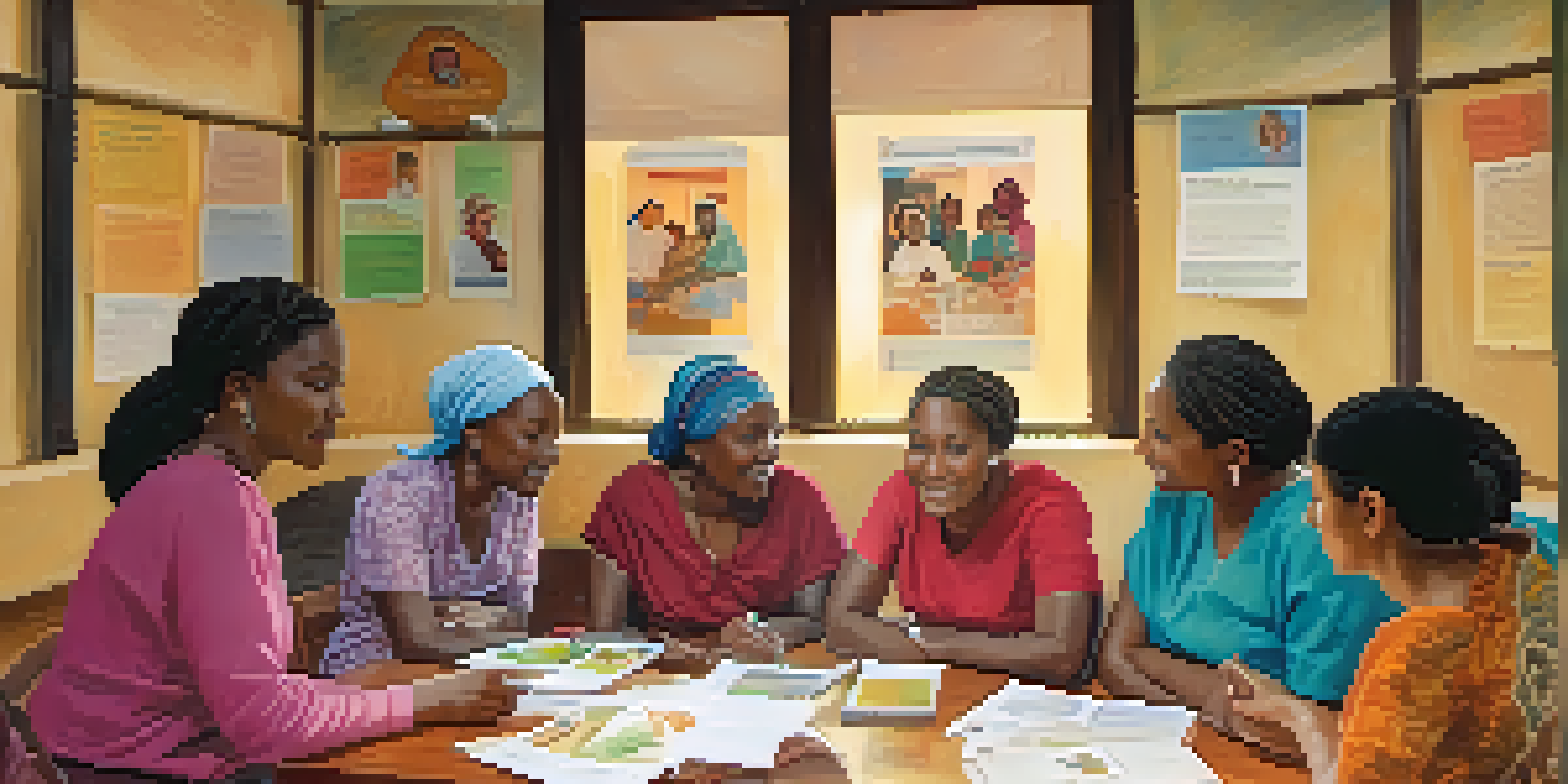Improving Maternal Health in Rural and Underserved Areas

Understanding the Challenges of Maternal Health in Rural Areas
Maternal health in rural areas often faces significant challenges, including limited access to healthcare facilities. Many women may have to travel long distances to receive prenatal care or deliver their babies, which can lead to delays in seeking help. Additionally, a shortage of healthcare providers in these regions exacerbates the problem, as fewer professionals are available to offer necessary support.
Health is a human right, not a privilege.
Cultural factors also play a role in maternal health outcomes. In some communities, traditional practices and beliefs may discourage women from seeking modern medical care. Education and awareness programs can help bridge this gap by informing women about the importance of prenatal care and safe delivery practices.
Moreover, socioeconomic factors contribute to the difficulties faced by pregnant women in rural areas. Limited financial resources can make it challenging for families to prioritize healthcare, and lack of transportation can further hinder access to services. Addressing these issues requires a multifaceted approach that considers both healthcare access and the broader social context.
The Importance of Community-Based Health Initiatives
Community-based health initiatives are crucial for improving maternal health in underserved areas. These programs often involve local volunteers and healthcare workers who understand the unique needs of their communities. By providing education and resources, they empower women to take charge of their health and seek necessary care.

For example, mobile health clinics can bring essential services directly to rural populations. These clinics can provide prenatal check-ups, education on childbirth, and even vaccinations, making healthcare more accessible. When women no longer have to travel long distances, they are more likely to attend appointments and receive timely care.
Access to Care is a Major Challenge
Limited healthcare facilities and long travel distances hinder pregnant women in rural areas from receiving timely care.
Additionally, peer support networks can play a vital role in maternal health. Connecting new and expectant mothers with others who have similar experiences can foster a sense of belonging and reduce feelings of isolation. These networks can also serve as a platform for sharing information and resources, creating a stronger community around maternal health.
Leveraging Technology to Enhance Maternal Health Services
Technology has the potential to transform maternal health care, especially in rural areas. Telemedicine, for instance, allows women to consult with healthcare providers remotely, eliminating the need for long trips to clinics. This can be particularly beneficial for women with high-risk pregnancies who require regular monitoring.
The best way to find yourself is to lose yourself in the service of others.
Mobile apps specifically designed for maternal health can also provide valuable tools for expectant mothers. These apps can offer reminders for appointments, educational resources, and even a platform for tracking symptoms or concerns. By utilizing technology, women can stay informed and engaged in their healthcare journey.
However, it's essential to ensure that these technological solutions are accessible to all women, regardless of their socioeconomic status. This might involve providing training on how to use these tools or ensuring that internet access is available in remote areas. Bridging the digital divide is crucial for maximizing the benefits of technology in maternal health.
Building Partnerships with Local Organizations
Collaborating with local organizations can significantly enhance maternal health initiatives. Nonprofit organizations, community groups, and faith-based organizations often have established trust within their communities. By partnering with these entities, healthcare providers can effectively disseminate information and resources to women in need.
For instance, local organizations can help organize workshops focused on maternal health education. These workshops can cover topics such as prenatal care, nutrition, and postpartum support, equipping women with the knowledge they need to make informed decisions about their health. Community involvement can greatly increase participation and engagement.
Community Initiatives Improve Health
Local health programs and peer support networks empower women to prioritize their maternal health through education and accessible services.
Furthermore, these partnerships can help address systemic issues affecting maternal health. By working together, organizations can advocate for policy changes that improve healthcare access and funding for maternal health programs. Collective action can lead to more significant and lasting improvements in maternal health outcomes.
Training and Retaining Healthcare Professionals in Rural Areas
To improve maternal health in rural areas, it's essential to focus on training and retaining healthcare professionals. Many regions struggle with a shortage of qualified providers, which can greatly impact the quality of care available. Investing in training programs that encourage medical professionals to work in underserved areas is crucial.
One effective strategy is to offer incentives such as loan forgiveness or relocation assistance for healthcare workers who commit to serving in rural communities. By reducing financial burdens, we can attract more professionals to these areas, ensuring that pregnant women receive the care they need.
Moreover, ongoing education and support for healthcare professionals can help them stay up-to-date on best practices in maternal health. This may involve regular training sessions, access to resources, and opportunities for professional development. Well-trained providers are better equipped to offer high-quality care, ultimately improving health outcomes for mothers and their babies.
Promoting Multi-Generational Support Systems
Multi-generational support systems play a critical role in maternal health, especially in rural areas. Families often share responsibilities, and having the support of extended family members can positively impact a mother’s experience during pregnancy and postpartum. This support can provide emotional comfort, practical help with childcare, and access to valuable advice based on lived experiences.
For instance, older family members can share traditional knowledge about childbirth and postpartum care, while also encouraging younger generations to seek modern medical assistance. This blend of traditional wisdom and contemporary practices can create a more holistic approach to maternal health.
Policy Changes Are Essential
Advocating for improved policies and resources can significantly enhance maternal health services in underserved communities.
Moreover, encouraging open communication within families about maternal health issues can help destigmatize seeking care. When women feel supported by their families, they are more likely to prioritize their health and wellbeing, leading to better outcomes for both mothers and their children.
Advocating for Policy Changes to Support Maternal Health
Advocating for policy changes is essential to enhancing maternal health in rural and underserved areas. Policymakers need to understand the unique challenges faced by these communities to implement effective solutions. By raising awareness about maternal health issues, we can encourage lawmakers to prioritize funding and resources for rural healthcare.
For example, advocating for improved transportation services can help pregnant women access healthcare facilities more easily. Policies that support the establishment of local clinics or mobile health services can also make a significant difference. When healthcare is more accessible, women are more likely to engage with the services they need.

Additionally, community members can take an active role in advocacy efforts by sharing their stories and experiences. Personal narratives can be powerful tools for change, illustrating the real-life impacts of inadequate maternal health services. By amplifying these voices, we can create a stronger movement for policy reform.